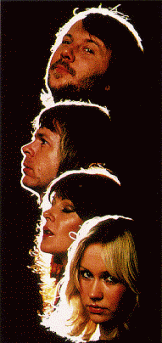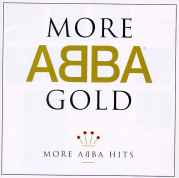
1-0 Reviews

|
Albums: |
 |
Links:
Official International Abba Fanclub
Title says it all Abba Info Central Extensive Online Abba resource ABBA: The Whole Story Article at Stylusmagazine.com, written by yours truly. |
Waterloo1974
Bjorn Ulvaeus: vocals, guitar
|
After Ring Ring and the near miss at the Eurovision Song Contest, Benny and Bjorn continued to write for the group. Almost since the day they had finished third at the contest, Stig and the writing duo had been planning for the 1974 contest. As it happened, there was something of a controversy in Sweden about the nature of the judging at the 1973 contest, and it had been decided by the contest organizers that a new method of determining the winner would be used henceforth. Abba’s entry, “Waterloo,” blew the field away in 1974.
The band used this momentum to quickly record their sophomore LP, named after their hit song. Benny and Bjorn were still feeling the pressure of the lack of preparation time (Abba were just starting their promotional whirlwind, which would not cease before the decade ended), so most of album suffers from similar faults as their debut: unstable “rock” gestures (“King Kong Song”), and odd genre exercises (horribly white reggae on “Sitting in the Palmtree”, even whiter funk on “My Mama Said”). The 1974 Eurovision Song Contest and “Waterloo” had certainly put Abba on the map, though it is not without some warrant that they were viewed as something of a one-hit wonder. Their big break was catchy enough, but what little precedent there was (if any) for Swedish light pop may have been overshadowed by the group’s flair for the superfluous.
Representative tracks
Waterloo: This was a tune that seemingly out of nowhere exposed the band’s strengths, as if the modest fame they had glimpsed during the previous year had inspired them to produce the very finest of which they were capable. At best, the song’s metaphor of love as a battle, and the “fatal” love affair was highly engaging pop (with an arrangement that saw Benny, Bjorn and co-writer Stig branching out of 70s pop-rock trends, and into a recognizable, more idiosyncratic sound); at its worst, it was merely infectious bubblegum pop. In any case, after the song’s victory, it was a major hit all around the world, breaking Abba in the all-important American radio singles market.
|
Super Trouper1980
Bjorn Ulvaeus: vocals, guitar
|
Super Trouper’s title refers to the giant spotlights used for Abba’s concerts, and whose light is depicted on the LP cover. The band chose this title before actually recording the song of the same name, though the song certainly seems to be fairly literal in its translation of the term (“Super Trouper lights are gonna find me”). Abba has never really been credited with writing “personal” songs, and though pure pop music is rarely about making confessional stances, the show-weary sentiment of “Super Trouper” is one of the most straightforwardly personal songs as you’re likely to hear on the radio.
Abba had already peaked in popularity, even as they continued to produce good pop music. By 1980, their songs had shifted from bubbly pop, to something more refined (and probably not as readily commercial). “The Way Old Friends Do” closed Super Trouper, serving as both a musical farewell to the passion of past relationships, and a symbolic farewell to touring, and generally all the hectic exposure of the last half-decade. They group was almost done.
Representative tracks
The Winner Takes it All: Agnetha took the lead vocal, and was accompanied by Benny on grand piano. Again, the theatrical method of contrasting soft and louder sections, and the dramatic build-up to the chorus was used to great effect by the band. Furthermore, Bjorn’s lyrics (admittedly, “colored by the divorce”) injected a fair amount of drama into the song.
|
Gold: Greatest Hits1993 |
What you see is what you get: Abba's greatest hits and near misses.
Sugary, bubblegum, innocent, tuneful, catchy, formulaic Swedish popsters. This band is one of the few that lives up to its hype. Whether or not that's a good thing depends on your taste. The band were massively popular in the 70s, and this album collects most of the reasons why. If you haven't heard the them, think the BeeGees meeting the 5th Dimension, or Fleetwood Mac without any interpersonal problems.
Representative tracksDancing Queen: Huge hit about (of all things) a girl who loves to dance. Very Saturday Night Fever-ish. Featured in the movie, "Muriel's Wedding". Take A Chance On Me: Good group vocals ("take a ch-ch-ch-chance") and infectious rhythm propel this piece of bubblegum to art-pop. The band always had great arrangements. |

|
|
|
Personnel:
Frida:
Agnetha Faltskog:
Björn Ulvaeus:
Benny Andersson: |
More Abba Gold1996 |
Second installment of the band's greatest hits and near misses.
Abba was basically a singles band, so these two greatest hits packages are the best place to start, and for most people, to stop. Many of these songs are far less known than those on the first set, and there is one song that was previously unreleased. Not for diabetics.
Representative tracksSummer Night City: Disco extravaganza. As escapist Europop goes, this is top of the line. Bjorn and Benny wrote almost all the tunes, and were ace arrangers. Honey Honey: This jingle-worthy ditty was a huge hit in Europe apparently, as were most of the band's singles. Imagine the Mentos commercial meeting the Partridge family at a church picnic. If you're still reading, buy this immediately. |

|
|
|
Personnel:
Frida:
Agnetha Faltskog:
Björn Ulvaeus:
Benny Andersson: |
